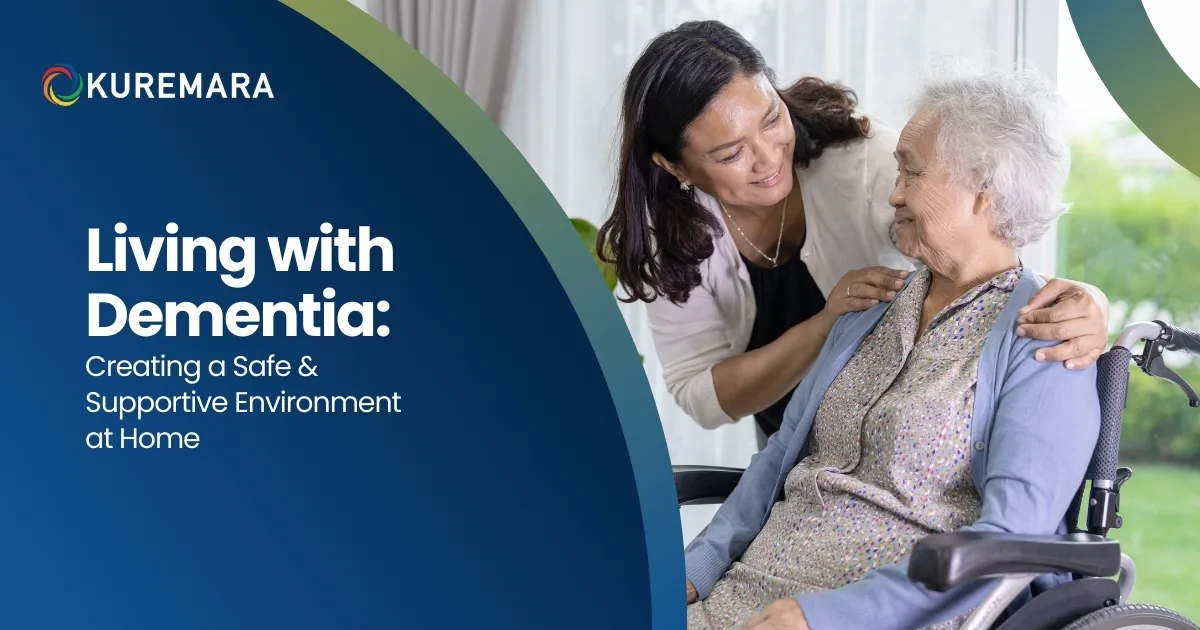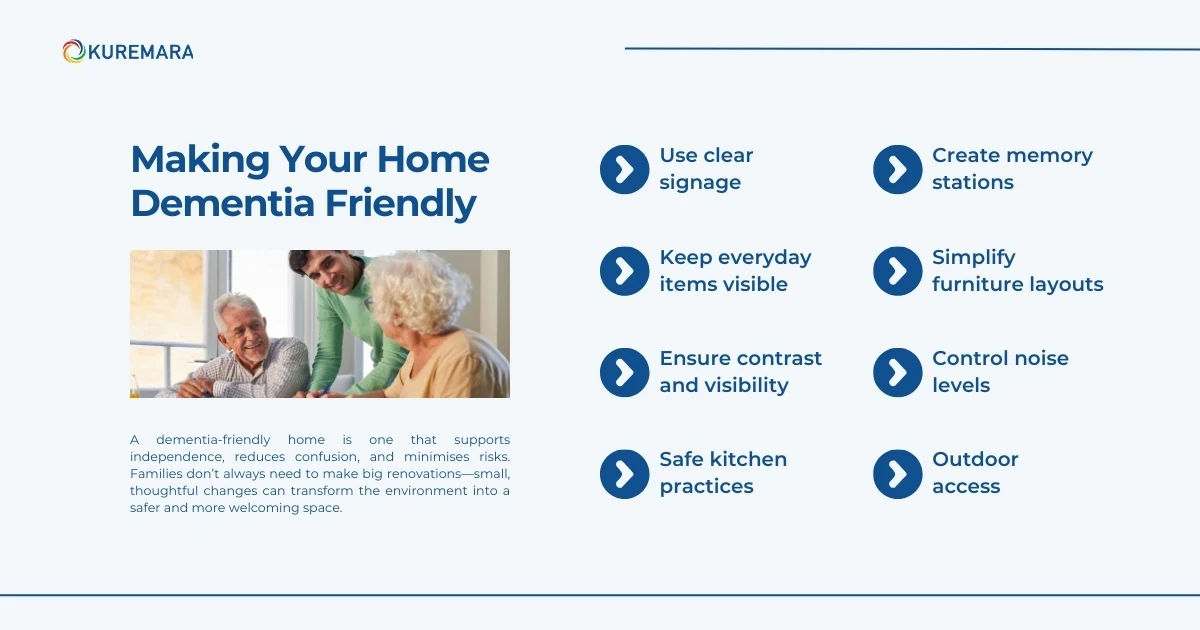
Living with dementia presents unique challenges, both for the individual and their loved ones. In the United Kingdom, where an estimated 944,000 people are living with dementia, the majority wish to remain in the comfort of their own homes for as long as possible. A familiar environment can provide reassurance, dignity, and independence. But creating a truly safe and supportive home requires thought, planning, and compassion.
This article explores practical ways to adapt the home, support well-being, and understand the journey of dementia care. It also provides guidance for families caring for parents or loved ones at home while highlighting where professional support, such as Kuremara’s services, can play a crucial role.
Understanding Dementia and Dementia Care
Dementia is not a single condition but a collective term for a range of symptoms that affect memory, problem-solving, communication, and behaviour. Common types include Alzheimer’s disease, vascular dementia, and Lewy body dementia.
What is dementia care? At its core, dementia care is about more than meeting medical needs. It means providing person-centred support that respects identity, promotes independence, and enables individuals to live meaningful lives. Care within the home environment is often the first choice for families, as it preserves routines and reduces distress caused by unfamiliar surroundings.
Dementia Aids for the Home
The home environment can either support or hinder the independence of someone living with dementia. Simple adjustments can make a significant difference:
- Lighting: Ensure hallways and staircases are well lit. Natural light reduces confusion and lowers the risk of falls.
- Clear pathways: Remove clutter, rugs, and obstacles to reduce tripping hazards.
- Labels and signs: Mark cupboards, doors, or drawers with text or pictures to help the person navigate daily tasks.
- Contrasting colours: Use colour differences for items like toilet seats, dinner plates, or furniture to make them more visible.
- Assistive technology: Devices such as motion-sensor lights, door alarms, and automatic shut-off kettles provide reassurance for both carers and the person with dementia.
These practical dementia aids for the home help create a safe, accessible, and confidence-building space.
Making Your Home Dementia Friendly

A dementia-friendly home is one that supports independence, reduces confusion, and minimises risks. Families don’t always need to make big renovations—small, thoughtful changes can transform the environment into a safer and more welcoming space. Here are some key steps:
- Use clear signage: Place signs with both words and pictures on doors (e.g., “Toilet,” “Kitchen”) to help with orientation.
- Create memory stations: A noticeboard with the daily schedule, important reminders, or family photos can provide comfort and clarity.
- Keep everyday items visible: Store frequently used objects, like cups or clothing, in plain sight to encourage independence.
- Simplify furniture layouts: Avoid clutter and keep furniture arranged consistently to prevent disorientation.
- Ensure contrast and visibility: Choose brightly coloured plates, table mats, or bedding that stand out against the background so items are easier to identify.
- Control noise levels: Reduce background noise from televisions or radios that may overwhelm or confuse.
- Safe kitchen practices: Install easy-to-use appliances, remove sharp objects when not in use, and consider automatic shut-off devices for stoves or kettles.
- Outdoor access: A secure, well-maintained garden can offer a safe place for exercise and relaxation.
These steps help create a home that feels less like a place of restrictions and more like a space of comfort and independence. Importantly, each home should be tailored to the individual’s preferences and needs, ensuring dignity is preserved while safety is prioritised.
Day-to-Day Living: Supporting Well-being at Home

Safety is only one part of the picture. Supporting mental and emotional well-being is equally vital:
- Engage in meaningful activities: Gardening, baking, puzzles, and music stimulate memory and give a sense of purpose.
- Encourage physical activity: Gentle walks, stretching, or chair exercises help maintain mobility and mood.
- Foster social connection: Visits from friends, community groups, or virtual catch-ups reduce isolation.
- Use reminiscence therapy: Looking through photo albums or listening to favourite music can spark recognition and joy.
Daily routines that combine structure with flexibility help reduce anxiety and provide a rhythm to the day.
Caring for a Parent with Dementia at Home
When caring for a parent with dementia, the emotional journey can be profound. Roles often shift, and the child becomes the caregiver. This can be rewarding but also overwhelming.
Challenges may include:
- Coping with changes in personality or behaviour.
- Managing fatigue from round-the-clock care.
- Balancing other family and work responsibilities.
Support is available. Carers in the UK can access training, respite services, and financial support through local councils. Organisations such as Dementia UK and the Alzheimer’s Society provide guidance, carer helplines, and resources to ensure families are not left to manage alone.
How Long Can a Person with Dementia Live at Home?
There is no single answer to this question. Many people can live at home through the early and middle stages of dementia with appropriate support. Some live comfortably at home for eight to ten years or more after diagnosis, depending on their overall health, environment, and available care.
Indicators that may suggest it is becoming unsafe for someone to remain at home include:
- Frequent wandering or falls.
- Difficulty managing personal hygiene safely.
- Significant challenges with eating or drinking.
- Caregiver burnout that impacts both parties’ well-being.
Proactive planning, such as adapting the home and arranging additional professional care, can extend the time a loved one can remain at home safely.
Planning Ahead for Independence and Safety
Early planning makes a huge difference in quality of life:
- Legal and financial planning: Setting up a Lasting Power of Attorney ensures decisions align with the person’s wishes.
- Advance care planning: Discuss future preferences before the later stages of dementia.
- Community resources: Engage with dementia-friendly groups, memory cafés, and support programs.
- Regular health check-ups: Maintain mobility, nutrition, and overall well-being to extend independence.
Recognising when additional support is required ensures that care is not only safe but also dignified.
Community and Care Home Alternatives
While many families strive to keep loved ones at home, there may come a time when specialist care is necessary. Care homes with trained dementia staff provide structure, activities, and medical oversight. In the UK, Care Quality Commission (CQC) ratings help families assess the quality of facilities.
There are also innovative care models emerging, such as dementia villages, which combine independence with safety in a supportive community setting. The key is to make informed choices that honour the person’s preferences and needs.
How Kuremara is Supporting People Across the UK
At Kuremara, we believe that every individual deserves compassionate, person-centred care. We understand that living with dementia or other health conditions is not just a medical journey but an emotional and social one as well.
Across the UK, our dedicated team provides:
- In-home support services that allow individuals to remain in their own familiar surroundings.
- Tailored dementia care, designed around the person’s unique history, routines, and abilities.
- Carer support and respite, giving families the chance to rest while ensuring their loved one continues to receive quality care.
- Holistic well-being activities, from social engagement to memory-building exercises, that help maintain independence and dignity.
We partner closely with families to ensure care is respectful, empowering, and aligned with both the person’s and the family’s wishes. Whether supporting daily living tasks or providing specialist dementia care, Kuremara is here to walk alongside individuals and their loved ones every step of the way.
If you’re exploring how to create a safer, more supportive home for a loved one, reach out to Kuremara today. Our team is ready to guide you through care options that fit your family’s needs and give you peace of mind.
Conclusion
Dementia may change how a person lives, but it doesn’t take away their need for love, dignity, and connection. With thoughtful adaptations, supportive routines, and professional guidance, it is possible for many individuals to live safely and meaningfully at home for years.
For families, caring for a parent or loved one at home can feel daunting, but support is always available. By combining personal effort with professional assistance, such as the services provided by Kuremara, families can create safe, nurturing environments that help loved ones thrive despite the challenges of dementia.



